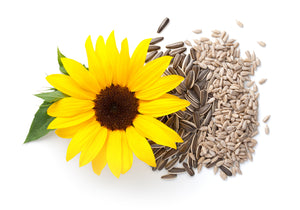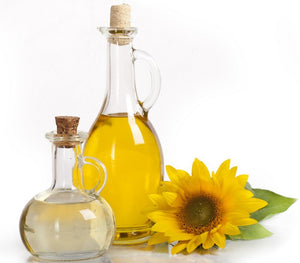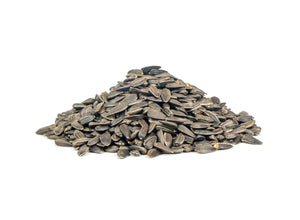Sunflower Ingredients
Sunflowers are not only vibrant and cheerful plants that brighten up any garden or field, but they are also incredibly versatile with numerous uses in various fields. From agriculture to beauty, sunflowers have carved a niche in multiple industries. Here’s an in-depth look at the many uses of sunflowers.
Sunflower Uses:
1. Edible Uses
Sunflower Seeds
- Snack Food: Sunflower seeds are a popular, nutritious snack. They are roasted and salted for added flavor.
- Cooking: Sunflower seeds can be used as a topping for salads, cereals, and baked goods, or blended into sunflower butter as a peanut butter alternative.
- Oil Production: Sunflower seeds are pressed to produce sunflower oil, a healthy and widely used cooking oil rich in unsaturated fats and vitamin E.
Sunflower Sprouts and Petals
- Culinary Garnish: Young sunflower sprouts and petals are edible and can be used to enhance salads and dishes with a mild nutty flavor.
2. Agricultural and Livestock Uses
Animal Feed
- Seed Cake: The byproduct of sunflower oil extraction is a protein-rich feed for livestock.
- Forage Crop: Sunflowers can be grown as forage for cattle, offering high-quality silage.
Cover Crops
- Soil Improvement: Sunflowers are used as a cover crop to prevent soil erosion, enhance soil health, and suppress weeds.
3. Industrial Uses
Sunflower Oil
- Biofuel: Sunflower oil can be processed into biodiesel, an eco-friendly alternative to fossil fuels.
- Industrial Lubricants: The oil is used in the production of biodegradable lubricants and solvents.
Fibers
- Paper and Textiles: The stalks of sunflowers can be processed to produce fibers for paper and textiles.
Dyes
- Natural Coloring: Sunflower petals can be used to make natural dyes for fabrics and crafts.
4. Ornamental and Landscaping Uses
Aesthetic Appeal
- Decorative Plants: Sunflowers are a favorite in gardens for their striking appearance and ability to attract pollinators.
- Floral Arrangements: Sunflowers are popular in bouquets and flower arrangements, symbolizing happiness and vitality.
Pollinator Support
- Bee and Butterfly Gardens: Sunflowers are excellent for attracting bees, butterflies, and other pollinators, aiding biodiversity.
5. Health and Wellness Uses
Skincare
- Sunflower Oil: Used in cosmetics and skincare products, sunflower oil is known for its moisturizing properties and is gentle on the skin.
Medicinal
- Herbal Remedies: Sunflower roots and petals are sometimes used in traditional remedies for treating fevers and inflammation.
6. Environmental Benefits
Phytoremediation
- Soil Cleaning: Sunflowers are effective at extracting toxins like heavy metals from the soil, making them useful for environmental cleanup projects.
Carbon Sequestration
- Sustainable Farming: Sunflowers contribute to reducing atmospheric CO₂ by acting as a carbon sink during their growth.
7. Cultural and Symbolic Uses
Symbolism
- Art and Literature: Sunflowers are often depicted as symbols of loyalty, happiness, and warmth in art and literature.
- Festivals: Many cultures celebrate sunflower festivals to honor their beauty and significance.
Traditional Uses
- Rituals and Offerings: Sunflowers are used in rituals and as offerings in various cultural and spiritual practices.
Sunflowers are more than just beautiful flowers; they are a powerhouse of utility across numerous domains. From providing food and oil to contributing to environmental conservation and artistic inspiration, sunflowers truly embody versatility and sustainability. Whether in your garden, kitchen, or skincare routine, these radiant plants are an invaluable resource.


